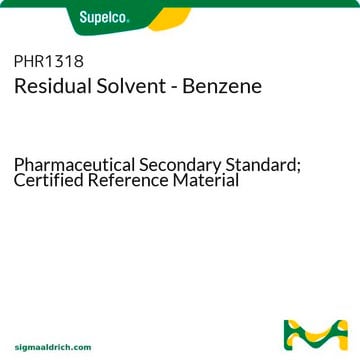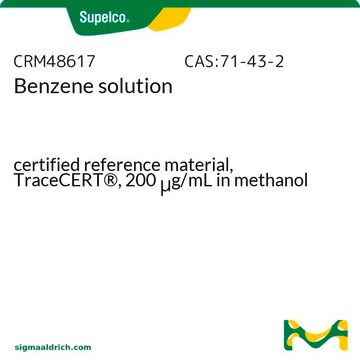PHR1310
Benzene
Pharmaceutical Secondary Standard; Certified Reference Material
About This Item
Recommended Products
grade
certified reference material
pharmaceutical secondary standard
Quality Level
Agency
traceable to NIST 3000
traceable to USP 1601146
vapor density
2.77 (vs air)
vapor pressure
166 mmHg ( 37.7 °C)
74.6 mmHg ( 20 °C)
CofA
current certificate can be downloaded
autoignition temp.
1043 °F
expl. lim.
8 %
technique(s)
HPLC: suitable
gas chromatography (GC): suitable
refractive index
n20/D 1.501 (lit.)
bp
80 °C (lit.)
mp
5.5 °C (lit.)
density
0.874 g/mL at 25 °C (lit.)
application(s)
pharmaceutical (small molecule)
format
neat
storage temp.
2-30°C
SMILES string
c1ccccc1
InChI
1S/C6H6/c1-2-4-6-5-3-1/h1-6H
InChI key
UHOVQNZJYSORNB-UHFFFAOYSA-N
Looking for similar products? Visit Product Comparison Guide
General description
Application
Analysis Note
Other Notes
Footnote
Recommended products
Signal Word
Danger
Hazard Statements
Precautionary Statements
Hazard Classifications
Aquatic Chronic 3 - Asp. Tox. 1 - Carc. 1A - Eye Irrit. 2 - Flam. Liq. 2 - Muta. 1B - Skin Irrit. 2 - STOT RE 1
Target Organs
Blood
Storage Class Code
3 - Flammable liquids
WGK
WGK 3
Flash Point(F)
12.2 °F
Flash Point(C)
-11 °C
Choose from one of the most recent versions:
Already Own This Product?
Find documentation for the products that you have recently purchased in the Document Library.
Customers Also Viewed
Our team of scientists has experience in all areas of research including Life Science, Material Science, Chemical Synthesis, Chromatography, Analytical and many others.
Contact Technical Service









